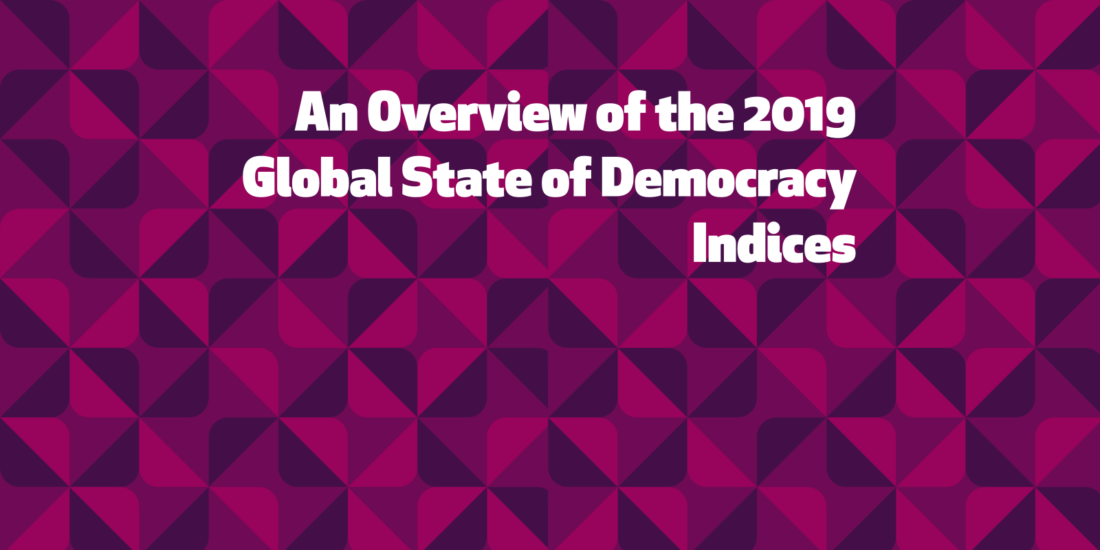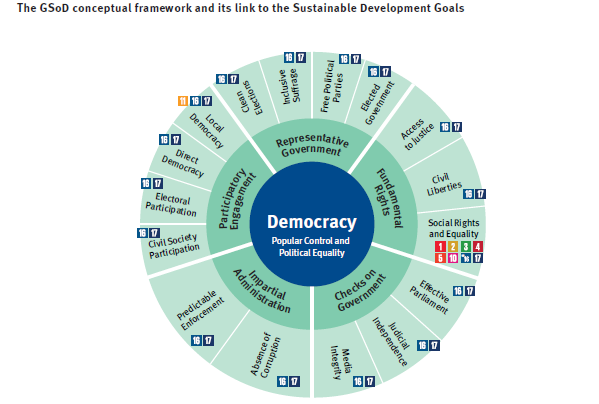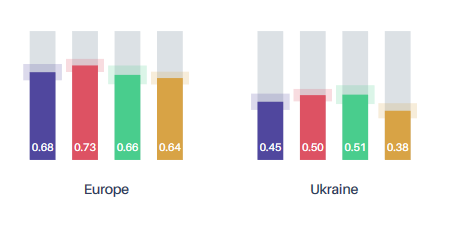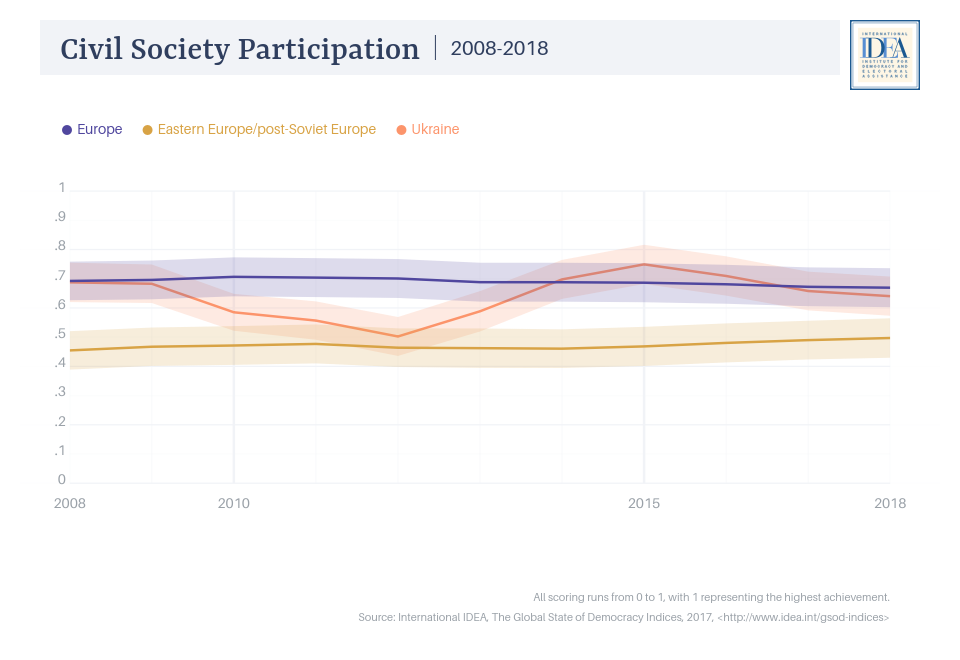The Global State of Democracy Indices (“GSoD” Indices) has depicted global, regional, and national trends in democratic development since 1975. The Indices are compiled from an impressive array of quantitative datasets that measure the GSoD Indices’ five fundamental attributes of democracy: “Representative Government; Fundamental Rights; Checks on Government; Impartial Administration; and Participatory Engagement.”
The scores of these five attributes themselves help to monitor progress on 8 of the 17 United Nations Sustainable Development Goals, goals that align closely to democratic health (see GSoD Framework).
The latest GSoD report provides a global trend analysis before discussing key developments across Africa and the Middle East, the Americas, Asia and the Pacific, and Europe (see Chapter 5). In Europe, the 2019 Indices notes democratic setbacks, including: a shrinking civic space, declines in civil liberties, clampdowns on civil society, restrictions on freedom of expression, weakened constitutional checks on executive authority, and a deteriorating rule of law. And while Europe scored the best after North America in GSoD indicators linked to Sustainable Development Goal 16 (Peace, Justice, and Strong Institutions) and Goal 5 (Gender Equality), it has confronted democratic backsliding in recent years. This backsliding is tied to anti-establishment political parties; the GSoD’s key indices paint a picture.
With respect to civil society developments, the share of European countries with high levels of “Checks on Government,” “Civil Liberties,” “Media Integrity,” and “Civil Society Participation” has declined, indicating a shrinking civic space. Of the ten democracies around the world currently experiencing democratic backsliding, six are in Europe, one is in the Americas, and three are in the Asia and the Pacific region.
Ukraine’s “Moderate Democratic Backsliding”
So, how does the GSoD 2019 Indices’ rank Ukraine?
Ukraine is included on a list of ten aforementioned countries experiencing democratic backsliding, together with its European counterparts Hungary, Poland, Romania, Serbia, and Turkey. However, Ukraine’s regression has been mild compared its regional neighbors.
The GSoD notes that Ukraine continues to score low to moderate in democratic attributes of “Representative Government,” “Fundamental Rights,” and “Checks on Government,” and quite poorly in “Impartial Administration.” Since 2010, Ukraine has experienced declining levels of “Representative Government” and more recently, “Checks on Government.”
On a macro-level, the figure below illustrates Ukraine’s performance in those four attributes relative to the European average.
A Diamond in the Rough: Exceptional Levels of Participatory Engagement in Ukraine
While the 2019 GSoD data above does not offer a composite score for Attribute 5, “Participatory Engagement,” Ukraine’s civil society actors will be interested to know that Ukraine scored exceptionally higher in Attribute 5 than in any of the other four main democracy attributes. Particularly interesting is the sub-attribute score of “Civil Society Participation,” or the extent to which people participate in civil society organizations.
With respect to “Civil Society Participation,” Ukraine scores a .64 in the 2019 GSoD Report, barely lagging behind the European score of .67. And similarly, Ukraine does not trail too far behind Europe in terms of “Electoral Participation” and “Local Democracy” scores, other sub-attributes of “Participatory Engagement.”
These scores suggest that while Ukraine has room to improve in the other GSoD attributes of democracy, its civil society is exceptionally vibrant, surpassing the average score of .5 tallied by Eastern European/post-Soviet Europe countries. The below chart focuses in on the sub-attribute of Ukraine’s “Civil Society Participation” performance over ten years, alongside Europe and Eastern Europe/post-Soviet states. Following the Revolution of Dignity, Ukraine observed its strongest levels of “Civil Society Participation” over the last decade. Even after some decline, Ukraine continues to outperform its Eastern European and post-Soviet neighbors.
Ukraine’s “Participatory Engagement” and “Civil Society Participation” scores are notable findings from the 2019 GSoD, though they should not come as a surprise. The GSoD findings corroborate numerous qualitative and quantitative studies on Ukraine’s civil society noting the high capacity of its citizenry—such as the USAID Civil Society Organization Sustainability Index—which stated that despite the ongoing conflict, Ukraine’s civil society actors are perhaps the strongest drivers of reform and quite capable actors when compared to regional neighbors.





